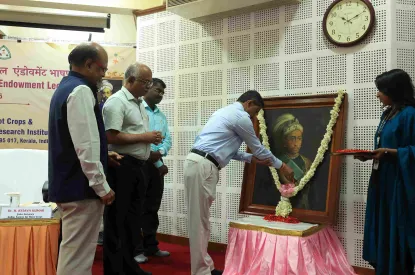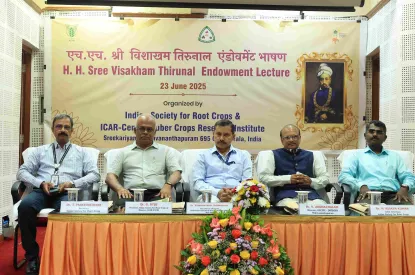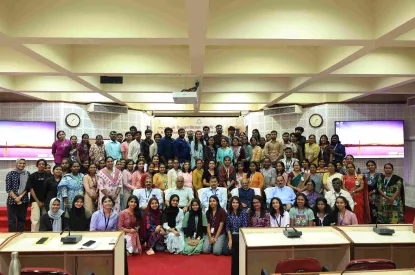The Indian Society for Root Crops (ISRC), in association with ICAR-Central Tuber Crops Research Institute (ICAR-CTCRI), Sreekariyam, organized the prestigious H.H. Sree Visakham Thirunal Endowment Lecture today, spotlighting recent advancements in agricultural biotechnology. Dr. G. Byju, Director of ICAR-CTCRI, in his presidential address, emphasized the crucial role of tuber crops in ensuring food and nutritional security — from the era of the Travancore kingdom to modern-day India. He highlighted the Institute’s continued dedication to research and development in tuber crops. He also mentioned that a new rice seed, developed for the first time using genome editing, shows high resistance to salt and drought. Dr. V. Arunachalam, Director of KSCSTE-Jawaharlal Nehru Tropical Botanic Garden and Research Institute (JNTBGRI), attended as the Guest of Honour. He spoke about the significant potential of tuber crops in fighting malnutrition and stressed the use of genome editing to improve crop yield and quality. Dr. Viswanathan Chinnusamy, Joint Director (Research) at ICAR-Indian Agricultural Research Institute (IARI), New Delhi, delivered this year’s endowment lecture. He led the development of the world’s first genome-edited rice seed, Pusa DST Rice 1. His lecture, titled "Genome Editing: India’s Trailblazing Path to the First Edited Rice Variety", explained the scientific process in simple terms for students and highlighted how this innovation aligns with India’s sustainable development goals. He stated that this genome-edited rice seed is expected to reach farmers within a year, pending completion of intellectual property procedures. He also projected that within the next 5–6 years, several genome-edited agricultural crops will be ready for large-scale cultivation. He noted that genome editing helps overcome limitations in seeds and allows for the addition of specific desirable traits. Dr. T. Makeshkumar, Secretary, ISRC, delivered the welcome address. The event concluded with a vote of thanks by Dr. H. Kesava Kumar, Joint Secretary, ISRC. The program was conducted in hybrid mode. More than 300 participants attended the program in person and online including the scientists and staff of ICAR-CTCRI, students from Kerala Agricultural University, Kerala University and Loyola School.








